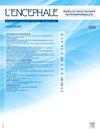Psychiatrists’ beliefs, awareness, and attitudes toward gender variance: A French cross-sectional study
IF 1
4区 医学
Q4 NEUROSCIENCES
Encephale-Revue De Psychiatrie Clinique Biologique et Therapeutique
Pub Date : 2025-06-01
DOI:10.1016/j.encep.2024.05.007
引用次数: 0
Abstract
Objectives
The evolution of knowledge and recommendations concerning transgender health has led to various representations, especially for health professionals, that can influence the medical management of transgender individuals. The main objective of this study was to explore the representation of psychiatrists in France regarding gender variance. The secondary objective was to compare these data based on their characteristics.
Methods
This is a cross-sectional observational study based on the distribution in April 2022 of a questionnaire to psychiatrists and psychiatric residents in France. The questionnaire was developed after exploring the results of qualitative studies in the scientific literature.
Results
Among 359 respondents, 181 were psychiatric residents and 178 were senior psychiatrists. Ninety percent had already met a transgender person in their professional practice. The representations observed among the respondents were heterogeneous. Most respondents did not consider “transgenderism” a symptom of a psychiatric disorder, and nearly all respondents used the gender and name their patients ask for. About 60% reported insufficient knowledge about “transgenderism”, with 86% considering that they had not been trained to adequately support transgender people.
Conclusions
The study reveals that representations, although weakened by a lack of knowledge recognized by psychiatrists, favor a non-pathologizing apprehension of gender variance and recognition of the importance of respecting gender diversity and self-determination. The heterogeneity of representations, as well as the high prevalence of professionals who describe a lack of knowledge, skills, and training, support the need for guidelines and the integration of evidence-based knowledge about gender variance into the psychiatric curriculum.
精神科医生对性别差异的信念、认识和态度:法国横断面研究。
目的:有关变性人健康的知识和建议的发展导致了各种表述,尤其是对医疗专业人员的表述,这可能会影响对变性人的医疗管理。本研究的主要目的是探讨法国精神科医生对性别变异的表述。次要目的是根据这些数据的特征对其进行比较:这是一项横断面观察研究,于 2022 年 4 月向法国的精神科医生和精神科住院医师发放了一份调查问卷。该问卷是在对科学文献中的定性研究结果进行探讨后编制的:在 359 名受访者中,181 人是精神科住院医生,178 人是高级精神科医生。90%的受访者在其职业实践中已经遇到过变性人。在受访者中观察到的表征各不相同。大多数受访者并不认为 "变性 "是精神疾病的一种症状,几乎所有受访者都使用了患者要求的性别和姓名。约 60% 的受访者表示对 "变性 "的认识不足,86% 的受访者认为他们没有接受过适当支持变性人的培训:这项研究表明,尽管精神科医生缺乏相关知识,从而削弱了他们的表述能力,但他们倾向于以非病理学的方式理解性别差异,并认识到尊重性别多样性和自我决定的重要性。表述的不一致性,以及专业人员普遍表示缺乏知识、技能和培训的情况,都表明有必要制定相关指南,并将有关性别差异的循证知识纳入精神科课程。
本文章由计算机程序翻译,如有差异,请以英文原文为准。
求助全文
约1分钟内获得全文
求助全文
来源期刊
CiteScore
4.60
自引率
7.40%
发文量
162
审稿时长
6-12 weeks
期刊介绍:
Une revue française de renommée internationale.
- Un comite de rédaction représentant tous les aspects de la prise en charge psychiatrique du patient.
- Une sélection rigoureuse d''articles faisant l''objet de plusieurs expertises.
- Des travaux d''auteurs et de chercheurs de renommée internationale.
- Des indexations dans les grandes bases de données (Current Contents, Excerpta Medica, etc.).
- Un facteur d''impact qui témoigne de la grande notoriété de la revue.
La tribune des publications originales de haut niveau.
- Une très grande diversité des sujets traités, rigoureusement sélectionnés à travers des sommaires dynamiques :
- des éditoriaux de médecins référents,
- une revue de presse sur les actualités internationales,
- des articles originaux pour approfondir vos connaissances,
- des mises au point et des cas cliniques pour engager votre réflexion sur les indications et choix possibles au travers de mises en situation clinique,
- des dossiers thématiques pour faire le tour d''une question.
- L''actualité de l''AFPB : L''Encéphale publie régulièrement des comptes rendus de l''Association française de psychiatrie clinique.

 求助内容:
求助内容: 应助结果提醒方式:
应助结果提醒方式:


